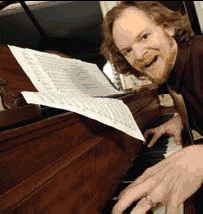Laptop Music
There are a lot of different forms of music being made - and laptop music is a recent addition to the list. I'm not talking about writing music on the laptop to have it played back (although that's certainly a tool composers have really taken advantage of allowing new compositions to be self-published). Nor am I talking about using the computer tied to a synthesiser to generate sounds. This new form is actually making the laptop itself a musical instrument. Ok - there are a lot of different forms of music, most of which will go by the wayside as a fade, an exploration, but nothing will come of them. I think this one has real possibilities. - It's not going to replace the orchestra for many things, but it is augmenting it.

